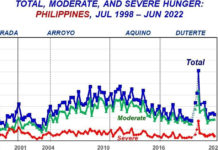
One of the happiest places in the world is the Philippines, wherein it ranked 20th among 140 countries that are reportedly able to provide “happiness” to their citizens.
According to the Happy Planet Index (HPI), the Philippines got an HPI score of 35.0. A report of a U.K. base think tank New Economic Foundation (NEF) which was released recently.
The HPI was obtained by combining four elements to show how efficiently residents of different countries are using environmental resources to lead long, happy lives.
- How they feel about life overall, on a scale from zero to ten.
- Life expectancy (average number of years a person in each country is expected to live.)
- Inequality of outcomes (“the inequalities between people within a country, in terms of how long they live, and how happy they feel”).
- The ecological footprint of the citizens of the country.
Ranking first on the 2016 list and with an HPI score of 44.7. is Costa Rica, was hailed as the happiest place on Earth. It registered 79.1 years for life expectancy, 7.3 rating for well-being with 10 being the highest, 2.8 global hectares for ecological footprint and 15 percent for inequality of outcomes. Also, it was previously been considered the happiest place in the world in 2009 and 2012.
Following in the ranks are Mexico, Colombia, Vanuatu, Vietnam, Panama, Nicaragua, Bangladesh, Thailand, Ecuador, Jamaica, Norway, Albania, Uruguay, Spain, Indonesia and El Salvador.
The Netherlands and Argentina were 18th and 19th, respectively.

The Philippines in the 20th, meanwhile, registered a life expectancy of 67.9 years, which is classified as “middling” or in the middle. Data was provided by the Population Division of the Department of Economic and Social Affairs of the United Nations.
The Philippines got a 5 in terms of well-being, an ecological footprint of 1.1 global hectares per person, classified as good and 26 percent in the inequality of outcomes.
The ecological footprint is expressed using a standardized unit of global hectares per person.
The report also noted that while wealthy western countries are usually regarded as “standards of success,” these countries do not rank highly on the Happy Planet Index.
According to NEF which promotes social, economic and environmental justice, the HPI measures what matters to everyone: sustainable well-being for all.
The Happy Planet Index which began and created by Nic Marks and was first introduced by the NEF in 2006, gives us a clearer picture of how individuals’ lives are going. It does this by measuring to what extent individuals live, how individuals are encountering their lives specifically and by catching the disparities in those appropriations rather than simply depending on the averages.
It likewise gives a compass to guide countries, and demonstrates that it is conceivable to live great lives without costing the Earth.” – JCE.












